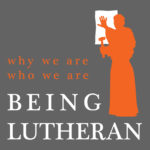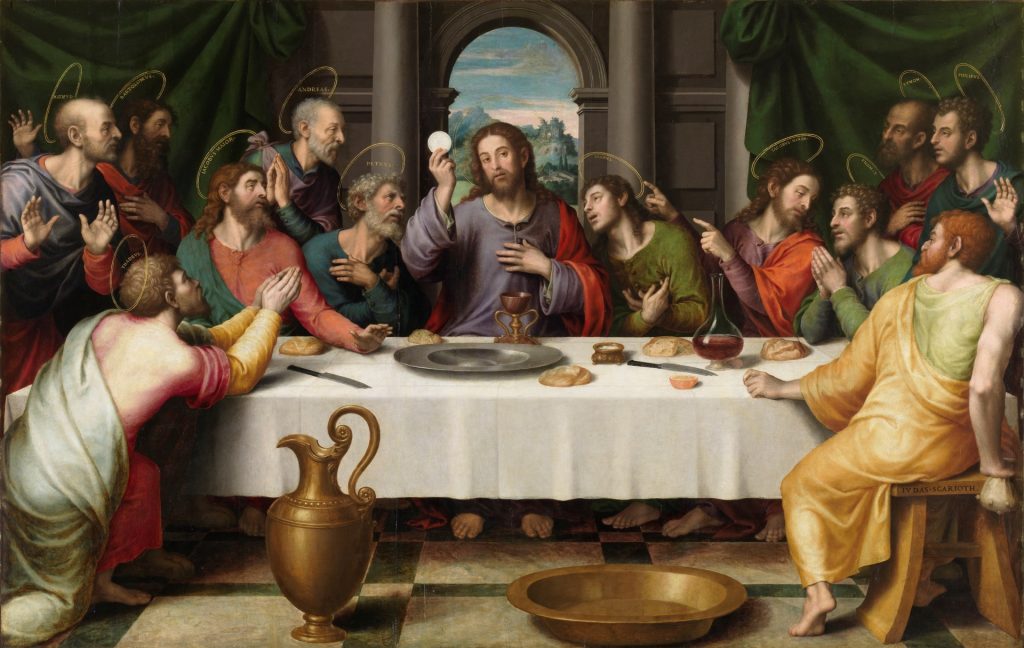
/
RSS Feed

In this episode, Brett, Brian, and Jason begin a new series on the Sacrament of the Altar with a broad introduction. Because of the layout of the Large Catechism, we are moving from Baptism to Holy Communion and will take up the subject of Confession and Absolution afterwards.

Hey guys,
I am really looking forward to gaining a deeper understanding of the Lutheran position on Communion. I especially appreciate that you do not want to go beyond what Scripture teaches. This is something Calvin emphasized and I think it is why we probably disagree. There are a couple things I hope you guys cover in this series and they are:
(1) On what passage(s) of Scripture do you base your use of the phrase “the Sacrament of the altar” in reference to this Sacrament? Why not use the term “the Lord’s Supper”? I attended a conservative, confessional LCMS church here in Austin for several months and I found the meal motif totally missing from the way in which they celebrated Communion. It seems to me that using the term “altar” emphasizes sacrifice which seems to have been secondary if not even tertiary to the concept of feeding on Jesus during the Last Supper. “Altar” also brings up the idea of whether you are re-sacrificing Jesus over again. I am sure you guys would not teach that but it is a problem, in my opinion.
Here is what Calvin wrote regarding the importance of emphasizing the meal motif:
“To all these things we have a complete attestation in this sacrament, enabling us certainly to conclude that they are as truly exhibited to us as if Christ were placed in bodily presence before our view, or handled by our hands. For these are words which can never lie nor deceive—Take, eat, drink. This is my body, which is broken for you: this is my blood, which is shed for the remission of sins. In bidding us take, he intimates that it is ours: in bidding us eat, he intimates that it becomes one substance with us: in affirming of his body that it was broken, and of his blood that it was shed for us, he shows that both were not so much his own as ours, because he took and laid down both, not for his own advantage, but for our salvation. And we ought carefully to observe, that the chief, and almost the whole energy of the sacrament, consists in these words, It is broken for you: it is shed for you. It would not be of much importance to us that the body and blood of the Lord are now distributed, had they not once been set forth for our redemption and salvation. Wherefore they are represented under bread and wine, that we may learn that they are not only ours, but intended to nourish our spiritual life; that is, as we formerly observed, by the corporeal things which are produced in the sacrament, we are by a kind of analogy conducted to spiritual things. Thus when bread is given as a symbol of the body of Christ, we must immediately think of this similitude. As bread nourishes, sustains, and protects our bodily life, so the body of Christ is the only food to invigorate and keep alive the soul. When we behold wine set forth as a symbol of blood, we must think that such use as wine serves to the body, the same is spiritually bestowed by the blood of Christ; and the use is to foster, refresh, strengthen, and exhilarate.” Institutes, IV. xvii. III
(2) On what passage(s) of Scripture do you guys base the idea of the ubiquity of Jesus’ body. I admit that the risen body of Jesus was different than his pre-risen body. For instance, it appears as if he was able to get into a room without using a window or door. But I am not aware of any passage of Scripture that even hints at the idea that Jesus’ body is capable of being in more than one place at a time. I am not saying the passage doesn’t exist but, if there are none, this might be an area in which you actually do go beyond what Scripture teaches.
(3) I don’t think it is correct to draw such a close relationship between Calvin’s view of this Sacrament and that of Zwingli. Zwingli is too closely associated with the idea of mere memorialism. However, I don’t know that it is actually fair to associate him with that perspective since I have read some things that seem indicate that he was more closely associated with Calvin’s “True Presence” model.
(4) With regard to the axiom, “the finite cannot contain the infinite”, this was not what Calvin taught. This was a later development most commonly associated with Francis Turretin in the 17th century. After all, aren’t all teacher undone by their students? 🙂 I would argue this phrase was a de-volvement more than a development of Calvin’s teaching. Unfortunately, this phrase and the associated ideas did gain hold of the American Presbyterian church through Princeton Seminary because Princeton used Francis Turretin’s “Institutes of Elenctic Theology” as its theological textbook instead of Calvin’s “Institutes of the Christian Religion”. Interestingly enough, Columbia Theological Seminary in South Carolina used Calvin’s “Institutes of the Christian Religion” as its theological textbook resulting in Southern Presbyterianism being more in line with Calvin on this point in particular than Northern Presbyterians.
(5) With regard to what “is” means, I will again be interested in what passages you guys rely on in asserting that the body and blood of Jesus are “in, with, and under” as this phrase seems to go beyond what Scripture teaches. It seems to me that Jesus simply said that the bread is his body and the wine is his blood and that we should stop there. Trying to explain a mystery is wrought with trouble. I prefer Calvin’s approach which is reflected in my absolute favorite quote of his on this topic:
“Now, should any one ask me as to the mode, I will not be ashamed to confess that it is too high a mystery either for my mind to comprehend or my words to express; and to speak more plainly, I rather feel than understand it. The truth of God, therefore, in which I can safely rest, I here embrace without controversy. He declares that his flesh is the meat, his blood the drink, of my soul; I give my soul to him to be fed with such food. In his sacred Supper he bids me take, eat, and drink his body and blood under the symbols of bread and wine. I have no doubt that he will truly give and I receive.” – Institutes IV. xvii. XXXII.
I especially love the statement “I rather feel than understand it”. How many people would have guessed that Calvin was the author of a statement like that?
(5) Lastly, I am interested in why the LCMS church I attended refused me access to the Table/Altar. In the PCA churches I have attended the pastors have always invited to the Table “all those who profess the true religion, and are communicants in good standing in any evangelical church”. I have always argued that if the doors of our Church are not as wide as the doors of heaven that there is a problem with our Church. I have also argued that if the invitation to the Lord’s Table is not as wide as the invitation to the Marriage Supper of The Lamb then there is a problem with our invitation.
I get it that Communion is a show of unity of theology. But to require unity on such a minute level seems a bit out of line with what we should be doing. I argue that as long as anyone subscribes to the ancient Creeds they are my brother and sister. But what if they disagree with us about the presence of Jesus in the elements? I would think that from a pastoral perspective we would want them to come, taste, and see that the Lord is good so that their faith in His presence in the elements is strengthened. Besides, I have no doubt that if pushed on the issue many of the people who were admitted to the Sacrament in that LCMS church we attended for those many months have a lower view of His presence than I do. But my family and I were denied access because we were not in lock step. I found that to be, at a certain level, offensive considering everything else on which we were united. I was starved for months and this is one of the main reasons I simply could not be Lutheran. But since the meal motif seems to be missing from the Lutheran practice of Communion I am not sure that they considered themselves to be withholding food that I desperately needed.
Please don’t get me wrong. I was not mad about it. I loved the worship, the sermons, and the people. I just found this to be an issue that was “a bridge too far” for me to join that Church.
Any way, I really look forward to learning.
Sincerely,
JT Borah
JT,
Thanks for your comments. I just wanted to let you know that I’ve distributed your comment to Brett and Brian, and whatever we don’t address on a normal episode in the Holy Communion series we’ll make sure to take up in a Q&A session at the end of the series.